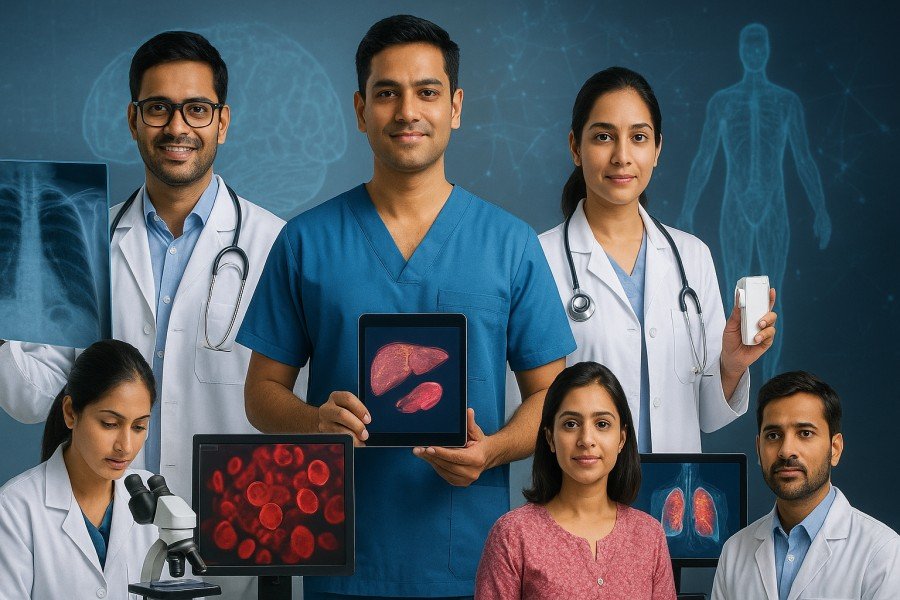Artificial Intelligence is transforming healthcare in India, especially in diagnostics where accuracy and speed can save lives. With the rising demand for affordable medical solutions, a new wave of healthtech startups is harnessing AI to bring early detection, cost efficiency, and better accessibility to millions. These ventures are not only reshaping the healthcare ecosystem but also catching the eye of global investors. Let us look at six AI healthtech startups in India that are making diagnostics faster and cheaper.
1. Qure.ai: AI for Radiology
Mumbai-based Qure.ai is one of the pioneers in applying AI to medical imaging. Their solutions analyze X-rays, CT scans, and MRIs in seconds, helping doctors detect conditions like tuberculosis, lung disease, and brain injuries. Hospitals using Qure.ai’s tools have reported significant reductions in reporting time, making diagnostics accessible in rural areas where radiologists are scarce.
2. SigTuple: Smarter Pathology
Bengaluru’s SigTuple leverages AI to automate the analysis of blood samples, urine tests, and semen analysis. The startup’s flagship platform, AI100, enhances the accuracy of lab reports while reducing turnaround time. By digitizing pathology slides, SigTuple also allows doctors to collaborate remotely, an important step toward accessible healthcare for smaller towns and villages.
3. Niramai: Early Cancer Detection
Niramai focuses on breast cancer detection through a novel, non-invasive, and radiation-free method called Thermalytix. Their AI-powered platform uses thermal imaging and advanced algorithms to identify abnormalities early, often before physical symptoms appear. This innovation has made cancer screening affordable and portable, enabling large-scale community health camps across India.
4. Predible Health: Lung and Liver Diagnostics
Predible Health specializes in AI-driven 3D imaging for lung and liver diseases. Their tools assist oncologists and pulmonologists in treatment planning by offering accurate segmentation and visualization. With India witnessing a surge in chronic illnesses, startups like Predible Health are crucial in reducing diagnostic costs and improving patient outcomes.

5. Tricog Health: Instant Cardiac Care
Cardiovascular diseases remain the leading cause of death in India. Tricog Health is addressing this by using AI-enabled ECG devices that deliver instant cardiac diagnosis. Their cloud-connected platform ensures that patients in remote clinics receive expert analysis in minutes, potentially preventing fatal delays in treatment.
6. Artivatic.ai: Personalized Health Insights
Artivatic.ai, based in Bengaluru, integrates AI into insurance and healthcare. Their diagnostic solutions combine patient history, genetic data, and lifestyle patterns to offer personalized health insights. By predicting disease risks early, Artivatic.ai helps patients adopt preventive measures while reducing the financial burden on families.
The Bigger Picture: AI and Healthcare Access
These startups showcase how AI can make diagnostics faster, cheaper, and more reliable. Beyond technology, they highlight India’s growing ecosystem of innovation where startups bridge the gap between healthcare demand and supply. Just as reforms like the GST Reforms Big Relief to Middle Class 2025 transformed financial systems, healthtech innovation is transforming accessibility in healthcare.
AI healthtech ventures also feature prominently in broader entrepreneurial discussions, alongside other breakthrough ideas covered in Startups to Watch in the Indian Market. Together, they reflect a future where technology and healthcare go hand in hand to serve millions more efficiently.
Conclusion
India’s healthcare challenges are vast, but AI-powered diagnostics are helping tackle them step by step. From rural accessibility to advanced urban care, startups like Qure.ai, SigTuple, Niramai, Predible Health, Tricog Health, and Artivatic.ai are setting benchmarks for speed, cost, and accuracy. With growing support from investors, policymakers, and hospitals, these companies are not just shaping the future of healthcare in India but also inspiring a global shift toward affordable diagnostics.
Follow Daily Fresh News and get the latest updates every day.








